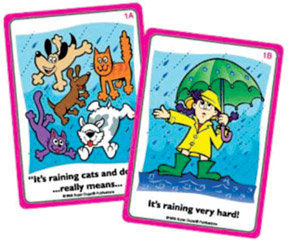Working with idioms or eating curd with razors?
 There's more than one way to skin a cat. In Spain each has his own
way to kill fleas, but what has that got to do with the price of eggs in
China? There's more than one way to skin a cat. In Spain each has his own
way to kill fleas, but what has that got to do with the price of eggs in
China?
Sometimes it is difficult to find the right words to express our
thoughts, so we use a set phrase or word that conveys an idea that is
unique to native speakers of a particular language and culture.
According to Wikipedia, "an idiom is a phrase whose meaning cannot be
determined by the literal definition of the phrase itself, but refers
instead to a figurative meaning that is known only through common use."
Idioms often use an image or symbol to describe something as clearly as
possible, so that we can make our point as effectively as possible. For
example, "in a nutshell" suggests the idea of conveying a lot of
information within very few words. Idioms tend to be informal and are
best used in spoken language, rather than written.
Idioms pose a particular challenge for translators working into their
target languages. For example, if a translator is unfamiliar with the
expression "to kick the bucket," he or she might incorrectly offer a
literal target-language rendition. In the English expression "to kick
the bucket," a non-native speaker who is familiar only with the meaning
of kick and bucket would be unable to determine the expression's actual
meaning ("to die"). Although the expression can refer literally to the
act of striking a bucket with a foot, native speakers rarely use it that
way because of its culturally accepted figurative meaning. Ideally, a
translator should find an idiomatic expression in the target language
that equivalently conveys the same message as the source idiomatic
expression. For example, if translating this for Sinhalese readership, I
prefer a vulgar Sinhalese phrase 'wala kajja gahanawa' as it cannot be
contextually translated into a formal Sinhalese phrase such as
'Abhaavapraaptha wenawa'.
 Using idioms effectively generally requires the translator to have
some localized foundational knowledge or experience regarding the
culture where they are used. Idioms are not so much part of a language
as they are a part of a culture. Since idioms are typically used as
colloquial metaphors within a particular culture, they are often
difficult to decipher outside of that local context. Some idioms can be
more universal than others, however, and can be easily translated so
that the metaphorical meaning can be more easily determined. Using idioms effectively generally requires the translator to have
some localized foundational knowledge or experience regarding the
culture where they are used. Idioms are not so much part of a language
as they are a part of a culture. Since idioms are typically used as
colloquial metaphors within a particular culture, they are often
difficult to decipher outside of that local context. Some idioms can be
more universal than others, however, and can be easily translated so
that the metaphorical meaning can be more easily determined.
Following examples will show how a seemingly simple idiom like "make
out" could mean: to decipher (as in "I can't make out his handwriting");
to pretend ("She is making herself out to be much more important than
she really is"); to fare ("How did you make out?"); to prepare ("I am
making out my will"); or to fondle ("They were making out in the back
seat"). The same English phrase can be interpreted in multiple ways
based on the context in which it is used. Context sets the stage for the
words we use and we must pay particular attention to it if we intend on
finding an idiom that is of true semantic equivalence.
Not all idioms have direct equivalents in another language, but there
are many that do. Part of their charm, especially when comparing across
languages, is the way in which different cultures have identified
similar social observations and coined their own phrase drawing from
their specific cultural experience and knowledge. When these idioms are
compared, they can offer a unique insight into the culture of a language
and those who speak it. Idioms are a part of everyday language.
Eccentric and abstract, sounding like a punch line to a joke or perhaps
the last line of a story, idioms are a fascinating mix of social
observation, history, function, abbreviation, humor and poetic license.
|



